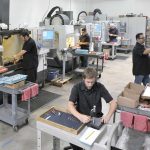The good old boys of Lansing politics who promise a return to the good old days of Michigan prosperity are steering the state in the wrong direction by ignoring the workplaces of the future that will provide good-paying jobs.
That’s according to a report released today by an Ann-Arbor based research group, Michigan Future Inc., that asserts the only path forward for the state requires a dramatic acceleration in college-educated talent that attracts 21st Century companies.
The alternative is a continuation of Michigan’s rather dismal status quo where about one-fourth of households earn a solid middle class income or better and the other three-fourths struggle to pay their bills on a routine basis.
“It should … be clear that trying to turn the clock back to recreate the economy of the past has not worked” said Michigan Future president Lou Glazer. “Both (political) parties in Michigan have been promising they can do that for decades, without success. Good-paying work today — and, even more so, tomorrow — looks much different than good-paying work in the past. This requires state policies that are aligned with — rather than resisting — the new realities of work.”
Most quality jobs involve managerial or creative work in offices, schools, universities, hospitals and specialized medical facilities. Nearly all require a college degree, preferably an advanced degree. Yet, Michigan lags far behind most states in the workforce attributes that lead to broad-based economic strength.
The old standby for politicians – lowering taxes for business – increasingly looks like an old-fashioned approach that no longer works in the modern economy.
The latest data compiled by the Tax Foundation shows Michigan’s business tax index ranks 12-best among all states. At the same time, the state rates 40th in in the proportion of adults who work and 32nd in per capita income.
Michigan Future cites an eye-opening study by the Georgetown University Center on Education and the Workforce that focused on who gained good jobs in the five years after the 2008-10 recession. Of the 2.9 million net new jobs that pay at least $53,000 a year, nearly all of them, 2.8 million, went to those with a bachelor’s degree. Some 152,000 jobs were landed by those with some college or an associate’s degree, and 39,000 fewer were secured by workers with a high school diploma or less.
Not all good-paying jobs require four years of college, the report concludes, but the preponderance of quality jobs require a four-year degree.
The report, “A Path to Good-paying Careers for all Michiganders: A 21st Century state policy agenda” demonstrated that, seven years of post-recession national expansion and a dramatic rebound in the domestic auto industry has lowered the state’s unemployment rate. But Michigan’s 21st Century slide from a high-prosperity state to a low-prosperity state shows no signs of reversing.
Following on the themes of its numerous past reports, Michigan Future for the first time offers specific recommendations: substantial increases in public investments for education at all levels; a stronger safety net for the poor and working class; and, as should seem obvious, tax increases at the state and local level.
The research group also proposes a worker-retention initiative that is somewhat reminiscent of the “Cool Cities” program devised by Gov. Jennifer Granholm in the mid-2000s. Except that Granholm’s attempt to keep young college grads in Michigan created a list of dozens of so-called cool cities across the state.
Michigan Future centers on two metropolitan areas, Detroit and Grand Rapids, that feature the cosmopolitan and cultural atmosphere that attracts millennials seeking to establish a professional career. Greater public improvements in Detroit and Grand Rapids could keep more kids in the state rather than see them flee to “talent magnets” such as Chicago and Minneapolis.
Of course, building a resilient, knowledge-based economy isn’t easy at a time when advances in automation – supercomputers, robotics and artificial intelligence – make long-term predictions about the evolving job market nearly impossible.
“We are living in a world where the gales of creative destruction blow stronger and faster,” the report concluded. “In an economy increasingly characterized by rapid and discontinuous change, successful individuals, enterprises, and communities will need to be agile: able to let go of what is no longer working and embrace — or better yet, create — the next wave.”





